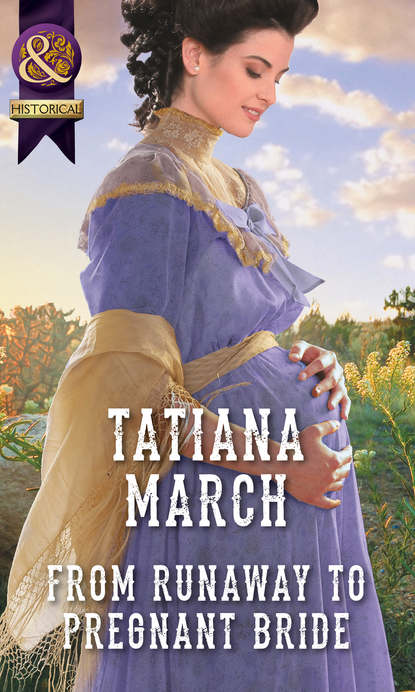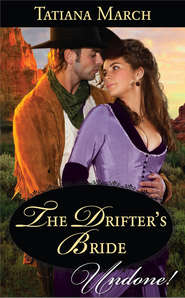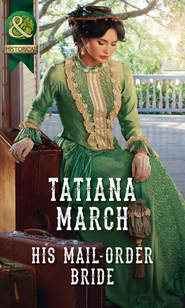По всем вопросам обращайтесь на: info@litportal.ru
(©) 2003-2024.
✖
From Runaway To Pregnant Bride
Настройки чтения
Размер шрифта
Высота строк
Поля
“No need.” Clay stretched out, unbuckled his gun belt but kept his boots on. “The buckskin will hear if anything comes. Wolves don’t stray this far south, and we’ve had no trouble from bears. Go to sleep.” He rolled over, turning his back on her. A minute later, Annabel could hear the sound of his even breathing.
Chapter Four (#u5365d4df-dd52-5332-8e16-de772c8fa7f6)
Clay woke to a crack of thunder. Lightning flared, throwing the pine forest higher up on the hillside into a stark relief that made him think of fingers pointing toward the sky. An instant later, darkness closed around him again, but his mind clung to the image of a small shape sitting on the ground near the edge of the overhang.
He waited for another flare of lighting. When it came, he knew his eyes hadn’t deceived him. He tossed his blanket aside and rolled to his feet, as agile as a mountain cat. Instead of strapping on his gun belt, he pushed the heavy Walker Colt into his waistband and eased over to the kid.
He dropped down to his haunches. “There’s no need to be scared, kid. It’s just a storm, and the ground slopes away. When the rain comes, the cavern will stay dry.”
“I’m not scared.” The kid’s voice was dreamy. “I love thunderstorms. It is different here. At home, you can hear the fury of the ocean and smell the salt spray. The seagulls screech in warning. A storm can mean death to a sailor.”
Clay listened, fascinated. Years ago, he used to carry around a book of poetry he liked to read from, but he had never heard anyone talk like that.
The kid went on, “Here the entire nature participates in the storm, like an orchestra playing a symphony. Thunder roars. Lightning cracks. The wind wails in the trees and the cliffs echo it back, multiplying the sound.”
Clay nodded in the darkness and spoke softly. “When the rain comes, it will add a drumbeat. Sometimes the water cascades down the cliffs so hard you can hear the rattle of pebbles as they roll along.”
Lightning was almost constant now. He could see the kid’s face, in quick snatches as the darkness broke. The delicate features drew his eyes. He liked looking at the kid, although he struggled to understand why. Maybe it reminded him of Lee and Billy, the other two kids he had tried to rescue in the past. Those memories were painful, but he found that looking at the kid gave him pleasure.
“I shouldn’t really like storms,” the kid said. “A storm took my parents. They drowned when their boat capsized. My father was a seaman.”
Clay nodded. His eyes searched the darkness, waiting for another flare of lightning, waiting for another glimpse of the kid. “I know what you mean,” he said quietly. “Sometimes a man can like something without understanding why.”
* * *
The storm passed overnight, and Annabel awoke to a bright dawn. With caution, she surveyed the cavern. The men were gone, their bedrolls and blankets neatly folded on a natural rock shelf by the entrance. At the opposite end, where the animals had sheltered, the stone roof sloped down, and in the far corner she could see a stack of equipment partly covered by an oilcloth tarpaulin.
Satisfied no one was watching, Annabel scrambled to her feet. The aches and pains from the tumble from the train made her wince. She patted her bowler hat, to make sure it remained securely in place, then ran her fingers beneath the brim, to tuck back out of sight any strands of hair that might have escaped. Next, she stamped her feet into the big boots, folded away her blanket and walked over to stack it with the others.
Voices came from the kitchen. Taking a deep breath, Annabel emerged out into the sunshine and set off along the path. The ground steamed in the morning heat, but the air felt cool and fresh after the storm. Mixed in with the scents of mud and wet leaves she detected the tempting aroma of coffee.
Under the timber canopy, Mr. Hicks was bustling by the stove and Clay was seated at the table, eating breakfast. His head was bent, his attention on the food. Annabel slowed her pace to study him. He was wearing a hat, but she could see curly brown hair peeking out beneath the brim, and lean, stubble-covered cheeks. His wide mouth pursed as he chewed each mouthful.
He must have heard her footsteps, for he looked up. Their eyes met, and her breath caught with the sudden jolt. She’d seen handsome men on the train—men who cared about their looks were more likely to have their shoes or boots polished—but none of them had affected her in the same way as Clay did.
A recollection flooded her mind of how it had felt to ride double with him, her body pressed against his. She’d worried about being stranded in the mining camp because it would postpone her reunion with her sisters, but now she welcomed the delay, for it would allow her an opportunity to get to know her rescuer.
“Good morning, gentlemen,” she called out from a distance.
“Ain’t that polite,” Mr. Hicks replied. “You got breeding, kid.”
Pausing to wash at the water barrel, Annabel inspected her appearance in the mirror fragment, not out of vanity but to make sure her disguise remained undisturbed. She continued into the kitchen and settled on one of the log stumps.
Mr. Hicks clattered a tin mug onto the table, poured in the thickest and blackest coffee Annabel had ever seen. He pushed the mug in front of her. “What do they call you, kid? Andy?”
Annabel took a sip of the bitter brew and shook her head. There was safety in the familiar. “My friends call me Scrappy.”
“Scrappy, huh?” Clay reached over and pinched his forefinger and thumb over the slender muscle on her upper arm. “We’ll soon fix that. Get some meat on your bones.”
When he withdrew his touch, the edge of his thumb brushed against the side of her bound breast. Annabel flushed. A strange tingle skittered along her skin, and she covered up her agitation by adjusting her weight on the log stump seat.
Mr. Hicks banged the pots and pans at the stove, came over to set a plate of ham and beans in front of her and settled at the table. She thanked him and ate in silence, observing the men, listening as they discussed the mining.
Mr. Hicks was more bark than bite, she decided, and Clay was one of those people who held his emotions tightly bottled up inside. Last night, during the storm, she had sensed a melancholy in him, but in the daylight he presented a front as closed and forbidding as the cliffs that soared behind the kitchen canopy.
When Clay got up to rinse his plate in the bucket that stood on the floor in the corner, Annabel took the opportunity to speak. “If you tell me what you like to eat and where everything is, I can help in the kitchen. I am accustomed to a stove like that.”
“Tomorrow,” Clay said. “Today I have another job for you.”
He gestured for her to follow. Annabel leaped to her feet and hurried after him, clumsy in her big boots. Clay paused to collect a sledgehammer from the low end of the cavern, and then he led her to the other side of the clearing where four huge timber spokes jutted out from a central hub, like a horizontal wheel set into a circular stone pit. Annabel could see two large rocks hanging on iron chains from the spokes.
Clay halted by the edge of the stone pit and studied the smaller rocks that filled the bottom. He picked up one, discarded it, selected another and straightened with the stone in his hand. “Do you know anything about mining, kid?”
“I thought it is done with pans in creeks.”
“That’s placer mining. We’re lode mining.” He gestured at the rocks covering the base of the stone pit. “That’s the ore. We dig it up in the mine and bring it here. This device is called an arrastre. The mule gets harnessed to one of the spokes and turns the arrastre around. The big rocks chained to the spokes crush the ore. That frees up the gold to be separated with water, just like in placer mining.”
He smiled at her. The low morning sun caught his eyes beneath the brim of his hat. Annabel felt a sudden tug in her chest. Green. His eyes were green, like the ocean by Merlin’s Leap. Oceans were mostly blue, Papa had told her, but the Atlantic by the Eastern Seaboard was usually green.
“Today,” Clay continued in a solemn tone, “the mule is tired from carrying you, so you’ll have to do his job for him.”
“I couldn’t...” Annabel stared at the arrastre, imagined herself harnessed to one of the spokes. She frowned at Clay. “You’re making fun of me.”
“Not at all. But you’ll crush the ore one piece at a time.”
He carried the small rock he had selected a few yards away and placed it on a big flat stone that stood inside a timber circle. He hefted up the sledgehammer and smashed it down on the piece of ore, breaking it into fragments. With a few more blows, Clay ground the fragments into rubble and swept them down to the ground within the timber circle.
“Watch your eyes, in case any stone chips fly up,” he instructed. “And try to make sure the pulverized ore stays inside the fence, so we don’t lose any gold.”
He handed the sledgehammer to her. The weight made her drop it.
Clay grinned. “You are meant to hit the ore, not your toes.”
He fetched another small rock from the arrastre, placed it on the stone slab. Annabel heaved up the sledgehammer and smashed it down. The piece of ore glanced off and landed on the ground outside the timber circle.
“Let’s try again.” Clay bent down, replaced the ore on the slab.
Annabel swung the hammer. Again. Again. Every blow jarred her arms and shoulders, but the rock resisted her efforts.
“Like this.” Clay took the sledgehammer from her.
At the fleeting touch of their hands, Annabel could feel the strength in him, could feel the roughness of his palm against the back of her fingers. Acutely aware of his nearness, almost as if he was touching her even when he wasn’t, she watched Clay lift the sledgehammer with one hand, then casually swing it down again. The rock crumbled into rubble, and he swept the remains down into the timber circle.
“Try a smaller rock,” he suggested.
This time Annabel chose a piece of ore the size of a grapefruit. She swung the sledgehammer. The rock merely bounced up and down. She turned to Clay. “I understand the task. You can go now.” She gestured at the arrastre. “It is not as if I am in danger of damaging the equipment. I think I can work without supervision.”
Clay contemplated her, shifted his shoulders and walked off. Annabel waited while he spoke to Mr. Hicks and then vanished out of sight behind a dried-up oak that leaned against the cliffs, presumably hiding the entrance to the mine.











